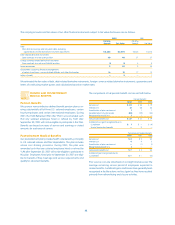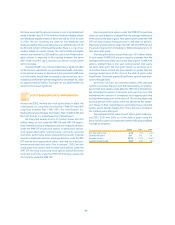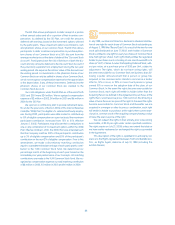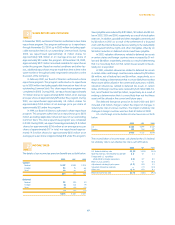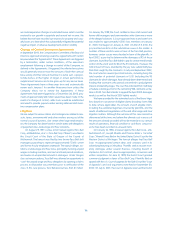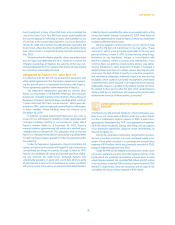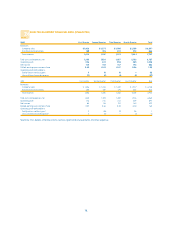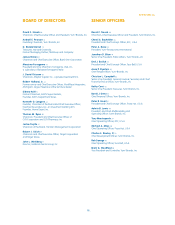Pizza Hut 2002 Annual Report Download - page 72
Download and view the complete annual report
Please find page 72 of the 2002 Pizza Hut annual report below. You can navigate through the pages in the report by either clicking on the pages listed below, or by using the keyword search tool below to find specific information within the annual report.
we could experience changes in estimated losses which could be
material to our growth in quarterly and annual net income. We
believe that we have recorded our reserves for property and casu-
alty losses at a level which has substantially mitigated the potential
negative impact of adverse developments and/or volatility.
Change of Control Severance Agreements
In September 2000, the Compensation Committee of the Board of
Directors approved renewing severance agreements with certain
key executives (the “Agreements”). These Agreements are triggered
by a termination, under certain conditions, of the executive’s
employment following a change in control of the Company, as
defined in the Agreements. If triggered, the affected executives
would generally receive twice the amount of both their annual
base salary and their annual incentive in a lump sum, a propor-
tionate bonus at the higher of target or actual performance,
outplacement services and a tax gross-up for any excise taxes.
These Agreements have a three-year term and automatically
renew each January 1 for another three-year term unless the
Company elects not to renew the Agreements. If these
Agreements had been triggered as of December 28, 2002, pay-
ments of approximately $33 million would have been made. In the
event of a change of control, rabbi trusts would be established
and used to provide payouts under existing deferred and incen-
tive compensation plans.
Litigation
We are subject to various claims and contingencies related to law-
suits, taxes, environmental and other matters arising out of the
normal course of business. Like certain other large retail employ-
ers, the Company has been faced in certain states with allegations
of purported class-wide wage and hour violations.
On August 29, 1997, a class action lawsuit against Taco Bell
Corp., entitled Bravo, et al. v. Taco Bell Corp. (“Bravo”), was filed in
the Circuit Court of the State of Oregon of the County of
Multnomah. The lawsuit was filed by two former Taco Bell shift
managers purporting to represent approximately 17,000 current
and former hourly employees statewide. The lawsuit alleges vio-
lations of state wage and hour laws, principally involving unpaid
wages including overtime, and rest and meal period violations,
and seeks an unspecified amount in damages. Under Oregon
class action procedures, Taco Bell was allowed an opportunity to
“cure” the unpaid wage and hour allegations by opening a claims
process to all putative class members prior to certification of the
class. In this cure process, Taco Bell paid out less than $1 million.
70.
On January 26, 1999, the Court certified a class of all current and
former shift managers and crew members who claim one or more
of the alleged violations. A Court-approved notice and claim form
was mailed to approximately 14,500 class members on January
31, 2000. Trial began on January 4, 2001. On March 9, 2001, the
jury reached verdicts on the substantive issues in this matter. A
number of these verdicts were in favor of the Taco Bell position;
however, certain issues were decided in favor of the plaintiffs. In
April 2002, a jury trial to determine the damages of 93 of those
claimants found that Taco Bell failed to pay for certain meal breaks
and/or off-the-clock work for 86 of the 93 claimants. However, the
total amount of hours awarded by the jury was substantially less
than that sought by the claimants. In July and September 2002,
the court ruled on several post-trial motions, including fixing the
total number of potential claimants at 1,031 (including the 93
claimants for which damages have already been determined) and
holding that claimants who prevail are entitled to prejudgment
interest and penalty wages. The court has indicated that it will likely
schedule a damages trial for the remaining 938 claimants some-
time in 2003. Taco Bell intends to appeal the April 2002 damages
verdict, as well as the March 2001 liability verdict.
We have provided for the estimated costs of the Bravo litiga-
tion, based on a projection of eligible claims (including claims filed
to date, where applicable), the amount of each eligible claim,
including the estimated legal fees incurred by plaintiffs, and the
results of settlement negotiations in this and other wage and hour
litigation matters. Although the outcome of this case cannot be
determined at this time, we believe the ultimate cost in excess of
the amounts already provided will not be material to our annual
results of operations, financial condition or cash flows. Any provi-
sions have been recorded as unusual items.
On January 16, 1998, a lawsuit against Taco Bell Corp., enti-
tled Wrench LLC, Joseph Shields and Thomas Rinks v. Taco Bell
Corp. (“Wrench”) was filed in the United States District Court for the
Western District of Michigan. The lawsuit alleges that Taco Bell
Corp. misappropriated certain ideas and concepts used in its
advertising featuring a Chihuahua. Plaintiffs seek to recover mon-
etary damages under several theories, including breach of
implied-in-fact contract, idea misappropriation, conversion and
unfair competition. On June 10, 1999, the District Court granted
summary judgment in favor of Taco Bell Corp. Plaintiffs filed an
appeal with the U.S. Court of Appeals for the Sixth Circuit (the “Court
of Appeals”), and oral arguments were held on September 20,
2000. On July 6, 2001, the Court of Appeals reversed the District




